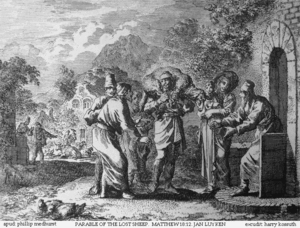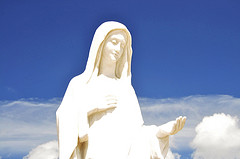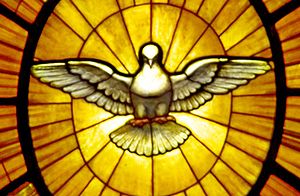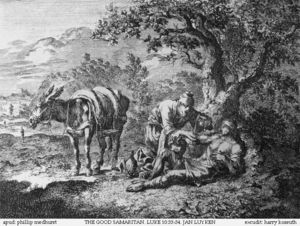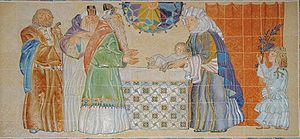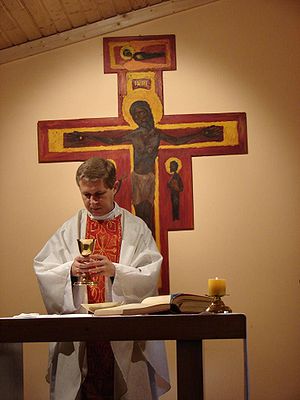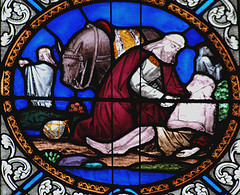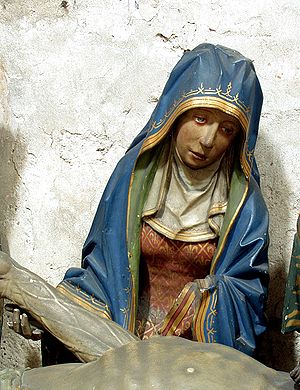The parable of the shepherd looking for his lost sheep relates to the Fifth Joyful Mystery of the Catholic rosary. Both center on the idea that Jesus calls us to put him first in our lives despite the challenges it may impose.
The Gospel for 9/12/10 is Luke 15:1-10. When the Pharisees criticized Jesus for welcoming sinners in his presence, he told them the parable of the lost sheep:
What man among you having a hundred sheep and losing one of them would not leave the ninety-nine in the desert and go after the lost one until he finds it? And when he does find it, he sets it on his shoulders with great joy and, upon his arrival home, he calls together his friends and neighbors and says to them, ‘Rejoice with me because I have found my lost sheep.’
I tell you, in just the same way there will be more joy in heaven over one sinner who repents than over ninety-nine righteous people who have no need of repentance.
While Jesus was talking about himself as the Good Shepherd and how he came into this world to help even the lowest sinner, let us try reversing the roles. Suppose you are the shepherd and Jesus is the lost sheep. The shepherd set out to find something valuable that he lost. Like the shepherd, we too are often seeking something valuable in our spiritual lives, namely God‘s grace. Similarly, the Fifth Joyful Mystery of the Catholic rosary tells the story of Mary and Joseph losing Jesus and looking for him in Jerusalem for three days before finding him in the temple. Both stories include the element of a difficult search whether it be the shepherd braving the elements looking for his sheep or Mary and Joseph’s frustrating three-day search for Jesus. Throughout the Gospel Jesus preaches about how those who follow him will face challenges and be persecuted and rejected by others. Jesus’ own life reflects those teachings by his suffering in the Passion and Crucifixion.
It is important to understand that our faith is not always easy and there will be times of difficulty. Faith often requires taking risks, going into the great unknown, and sometimes encountering “dead ends” and disappointment. For instance, it is not always easy to pray regularly, avoid sin, and receive the Sacraments. It is even harder to love God when it seems like our life is falling apart such as losing a job or the death of a loved one. Often we just don’t want to put in the effort to incorporate Jesus into our lives because it does not seem like we get anything out of it in return.
The Catholic Church teaches us that we will be rewarded with all the comforts of Heaven when we keep Jesus close to our hearts and work hard to come back into his graces if we sin. But no matter how many times you hear that, the only way you will actually overcome life’s trials and misfortunes is if you actually BELIEVE it. After all, why should you work so hard for God’s grace if you don’t believe it has any meaningful value? It is the belief in God’s Kingdom that drives us forward even in the most difficult of times. Belief, along with the help of the Church, the Holy Spirit, the saints, Mary, and the angels in Heaven will push us through to the glory of God’s internal kingdom. We can solicit their help either for ourselves or for others who do not have their heart centered on finding Jesus.
When we pray the rosary and especially the Fifth Joyful Mystery, let us ask God for the strength to endure life’s stuggles in our search for Jesus. We must pray for those who do not put a high value on God’s grace or are having difficulty finding the energy to continue on the road of faith. Finally, let us pray that we have the awareness to spot those who are struggling and use any extra spiritual energy to help them out and turn them into believers that God’s Kingdom of Heaven is worth the difficult journey.
Related articles by Zemanta
- Imagine a World 2 (beliefnet.com)
- Seeking What’s Lost (pjsprayerline.blogspot.com)
- The Shepherd (joshharris.com)


